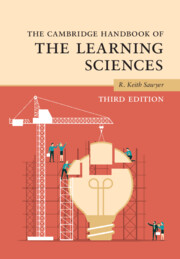Book contents
- The Cambridge Handbook of the Learning Sciences
- The Cambridge Handbook of the Learning Sciences
- Copyright page
- Contents
- Figures
- Tables
- Contributors
- Preface
- 1 An Introduction to the Learning Sciences
- Part I Foundations
- Part II Methodologies
- 9 Design-Based Research
- 10 Analyzing Collaboration
- 11 Microgenetic Methods
- 12 A Learning Sciences Perspective on the Design and Use of Assessment in Education
- 13 Learning Analytics and Educational Data Mining
- Part III Grounding Technology in the Learning Sciences
- Part IV Learning Together
- Part V Learning Disciplinary Knowledge
- Part VI Moving Learning Sciences Research into the Classroom
- Index
- References
10 - Analyzing Collaboration
from Part II - Methodologies
Published online by Cambridge University Press: 14 March 2022
- The Cambridge Handbook of the Learning Sciences
- The Cambridge Handbook of the Learning Sciences
- Copyright page
- Contents
- Figures
- Tables
- Contributors
- Preface
- 1 An Introduction to the Learning Sciences
- Part I Foundations
- Part II Methodologies
- 9 Design-Based Research
- 10 Analyzing Collaboration
- 11 Microgenetic Methods
- 12 A Learning Sciences Perspective on the Design and Use of Assessment in Education
- 13 Learning Analytics and Educational Data Mining
- Part III Grounding Technology in the Learning Sciences
- Part IV Learning Together
- Part V Learning Disciplinary Knowledge
- Part VI Moving Learning Sciences Research into the Classroom
- Index
- References
Summary
Learning sciences researchers study different types of collaboration, study it for different reasons, and use a variety of methods. Many of these methods focus on talk and interaction patterns, often using a methodology called interaction analysis that builds on linguistic anthropology and sociolinguistics. This chapter reviews four broad approaches: collaboration as a window onto individual learning; collaboration as a way to study how to help students learn better; collaboration as a way to study how collaboration changes during learning; and collaboration itself as a form of learning. These approaches differ along four dimensions: the unit of analysis for describing collaborative processes; the unit of analysis for documenting learning outcomes; the degree to which those learning outcomes are identified within the collaboration or outside the collaboration; and the degree to which the researcher considers some forms of collaboration to be more effective.
- Type
- Chapter
- Information
- The Cambridge Handbook of the Learning Sciences , pp. 196 - 216Publisher: Cambridge University PressPrint publication year: 2022
References
- 2
- Cited by

